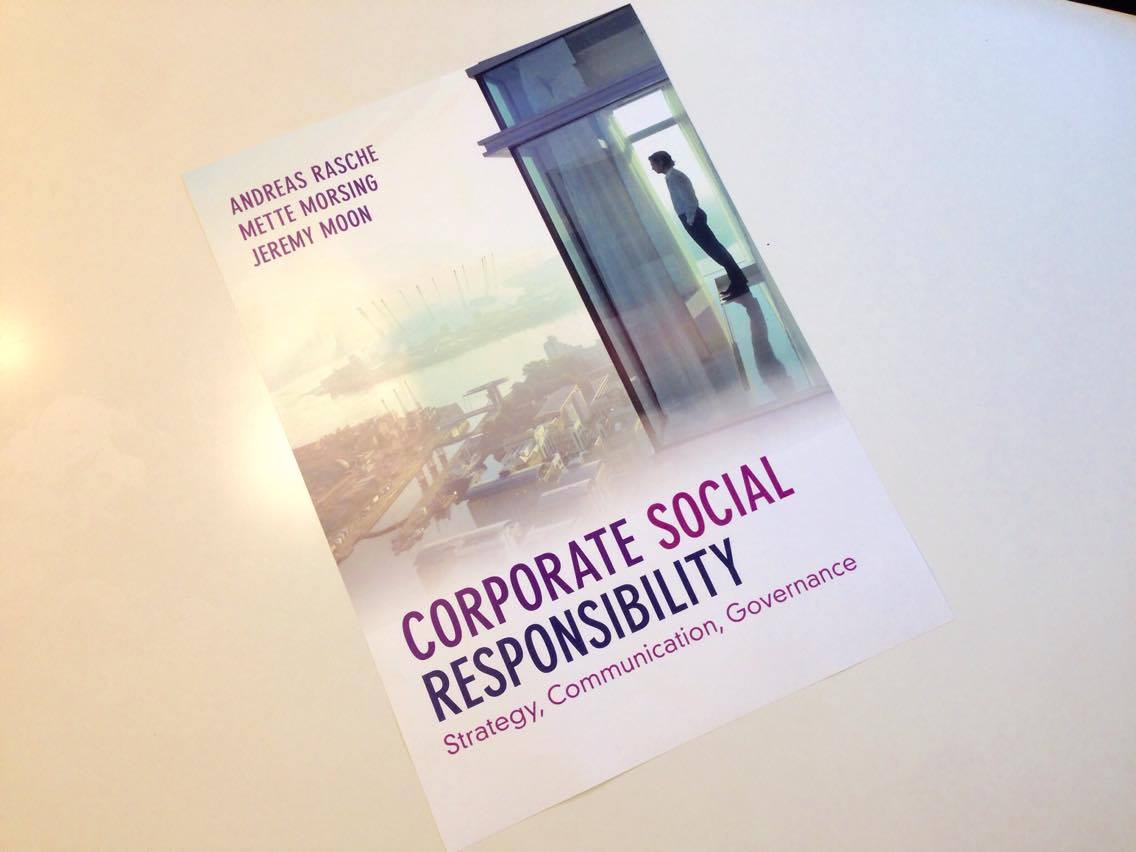By Andreas Rasche, Mette Morsing, and Jeremy Moon.
We – Andreas Rasche, Mette Morsing, and Jeremy Moon – just edited an international textbook entitled Corporate Social Responsibility: Strategy, Communication, Governance (Cambridge University Press). When talking to people about the book, one common response was: “Why didn’t you just call it Corporate Sustainability? After all, this term is used by everybody these days…” In 2014, Peter Bakker, the President of the World Business Council for Sustainable Development, even declared: “CSR is dead. It’s over.” And Michael Porter and Mark Kramer made a very similar claim when pitching their “shared value” concept a couple of years earlier.
Mr Bakker’s main point was that CSR is mostly about philanthropy and that it is not properly embedded into business models yet. It is hard to disagree with this statement, but nevertheless neither Mr Bakker nor Mr Kramer and Professor Porter got to one point:
The core of the problem
First, if you do not have an antique understanding of CSR (as preached in the late 70s), you will recognize that it actually is about integrating firms’ social and environmental responsibilities in their value and supply chain activities as well as their business models. This is precisely what the entire debate on “strategic CSR” has been aiming at. Those companies who understand CSR in a contemporary way know that they have to integrate their responsibilities vis-à-vis society into everything they do; and this is not necessarily because they are environmentalists or social protagonists but because this is what society expects from them and this is what provides them with their license to operate.
However, simply changing labels from “CSR” to “Corporate Sustainability” won’t make firms more aware that their business models need to be aligned with their responsibilities vis-à-vis society. While Corporate Sustainability may enable a smoother dialogue between management scholars and economists and while it may also help to engage in dialogue with peers from the natural and technical sciences, it also blurs the importance of firms’ ethical responsibilities. In fact, one could argue that while the Corporate Sustainability language has increasingly helped to engage the investor community into what they label Environmental, Social and Governance (ESG) issues, it has also sidelined important ethical dilemmas that were once at the core of the debate.
Second, we should not too quickly disparage corporate philanthropy as an outdated concept. Currently, philanthropic contributions are a key driver of many partnerships in support of broader development goals such as the UN’s Sustainability Development Goals (SDGs). Also, philanthropic contributions are often quite “strategic” – many firms directly benefit from such contributions, such as when charity investments in education secure a skilled future workforce. Also, many SMEs make strong philanthropic contributions to the local communities around them – for them CSR is a matter of personal values (often driven by the owner-manager). Yet, this can bring benefits of employee motivation (as, somewhat paradoxically, even Milton Friedman noted), social marketing and customer loyalty.
The bottom line: rationales, not labels
The core of the problem lies not so much in labels. It more profoundly lies in the challenges that systemic injustice, corruption, human rights and climate change pose for society and for business, and the resources and strategies that businesses bring to address them. Therefore, we should not focus too much on labels – labels come and labels go. But we should rather focus on ‘rationales’.
Actually, Chapter 2 of our book makes exactly this point. Corporations are often quickly relabelling and repackaging their engagement with responsible and sustainable business. What was formerly described as ethics was translated into CSR and now turns into Corporate Sustainability. In the future it may be given even another name. This is not to say that corporate practices are not changing. Actually, there is a lot of innovation around corporate sustainability and many firms have learned a great deal about which material issues need to be addressed. It is to say, however, that we should not simply throw away the “old” and believe that the “new” will be the Holy Grail.
In this sense, editing a textbook on “Corporate Social Responsibility” is a very timely undertaking. We cannot ignore the big societal challenges that are ahead of us, and by educating the business wo(men) of tomorrow we have to acknowledge that firms’ responsibilities have to be deliberately managed, regardless of whether we call this “CSR”, “corporate sustainability”, “shared value” or something else. We hope that our book will convey exactly this message.
CSR is a continuous journey
The point for us is this: Responsible and sustainable business has to be alive in our minds; it has to shape what we do, how we do it, and why do it. We have to look beyond and behind the different labels we ascribe to responsible business behavior. Truly engaging with a book is but one of the many important ways to achieve just that… CSR is a journey that has just begun and that continues to unfold on a daily basis.
Long live CSR!
Info: The book “Corporate Social Responsibility: Strategy, Communication, Governance” edited by Andreas Rasche, Mette Morsing, and Jeremy Moon is available from 17 March 2017.
Andreas, Mette and Jeremy are editors-in-chief of the BOS Blog and Professors at Copenhagen Business School’s World Class Research Environment Governing Responsible Business.
Poster by Cambridge University Press.
